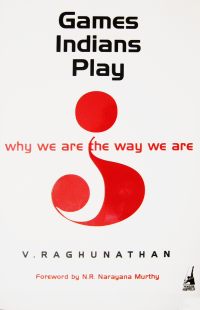As Friday wound down, my sore body was resigning itself to a weekend to be spent mainly in bed. But what to feed the beast that roams within ? Out I went to Strand, to hunt for something cerebral, to stimulate thought and induce sleep (when consumed in excessive doses). An unsuccessful hour later, I emerged carrying a copy of Games Indians Play.

Somehow in the back of my mind, I was expecting an Indian re-run of Games People Play. But maybe I was setting the bar too high. The book begins rather uncomfortably, by stating a few prerequisites, right from the depths of disillusionment.
There are three points that the readers must be ready to acknowledge as prerequisites: one, that there is indeed something wrong with us; two, that there are aspects that do not seem to sit well in modern civilized society; and three, that merely because other modern and civilized societies, also suffer from many ills, it does not make our own ills more acceptable.
Indeed, the book does tend to critique at a rather personal level than would be necessary. The following four chapters were a visible re-hash of nearly all literature on the subject in the last forty years. The basic systems by which selfish individuals coalesce into a mesh of cooperation explained by game theory principles. For someone who's been on Axelrod for two years, it hardly holds any interest. Except for one particular analogy.
Both India and Pakistan argue exactly as the two prisoners cited in the prisoner's dillemma, and arrive the 'rational and well reasoned' decision to go nuclear - to defect - resulting in the two countries forgoing the opportunity to save millions of rupees which could have been used [better].
The book somewhat redeems itself, by then attacking the concept of fairness. Reading through it, I somehow seemed to recall the famed lines from Animal Farm - All animals are equal, but some animals are more equal than others. But it rather rambles along into the lack of self-regulation and the inherent disregard for others doing the same (as lunatech keeps saying: lesson #1: the universe isn't fair). Eventually to come to rest at the way Indians measure the importance of a person - purely by how many rules he can bend.
But to fulfil its initial promises, it hasn't gone far enough into the depth of the issue. Rather than discuss selection pressures which reward the behaviour that we observe, it merely presents the facts and leaves a rather dissapointed reader behind. And while the book doesn't even try to tackle the vast agrarian belt of India - it still does not understand that there's more of sub-urban India outside the big cities and inside houses. For something like the state of Kerala - a middle class majority, left-leaning socialist governments and high literacy rates seem to have alleviated at least some of the ills mentioned.
Rather than a cutting root cause analysis of the systemic problems that exist, the book seems to be written in half-disgust about the myopia of present day urban India, with game theory to back it up. Not to disagree with some of his conclusions, but the linking logic seems to from real life into game theory rather than the other way around - leaving me nothing to test his theories with. And there is just a subtle hint of silent reverence towards occidental cultures - a completely apples to oranges comparison (you eat both, right ?). The author desperately needs to read The Human Zoo, before judging the Indian concrete jungles by theories transplanted from university towns (Ithaca or wherever).
In one short phrase, the book talks more about "How/What we are ?" than rationalizing it with Why ? - an outsider's objective analysis which puts you (if you were Indian) in the same frame of mind as the emperor with the new clothes.
Along with this, I'd also picked up Just Wait Till You Have Children of Your Own!. Drains me of all bitterness, that book does. :)
--The end of the human race will be that it will eventually die of civilization.
-- Ralph Waldo Emerson
